Summary Overview
Adoption of Integrated Outsourcing of HR Services Market Overview
The global market for integrated outsourcing of HR services is rapidly evolving, driven by the need for organizations to enhance efficiency and focus on core business functions. This trend is fueled by technological innovations and a shift towards flexible workforce management solutions. Companies increasingly prefer integrated models that consolidate various HR functions, simplifying vendor management and fostering collaboration.
Recent data shows a strong emphasis on selecting vendors with advanced technological capabilities and regulatory compliance expertise. However, challenges such as data security and employee engagement persist. Leveraging digital procurement tools is essential for overcoming these hurdles, enabling organizations to achieve cost savings and operational efficiencies in a competitive landscape. . Additionally, we address future procurement challenges and emphasize the importance of digital procurement tools in accurately forecasting market needs to keep clients ahead in this dynamic landscape. Strategic sourcing and procurement management play a crucial role in streamlining the procurement process for service development. As competition intensifies, companies are leveraging market intelligence solutions and procure analytics to optimize their supply chain management systems.
The outlook for the integrated outsourcing of HR services market is promising, with several key trends and projections indicating strong growth through 2032:
-
Market Size: The global market for integrated HR outsourcing is expected to reach approximately USD 50 billion by 2032, reflecting a compound annual growth rate (CAGR) of about 10% from 2024 to 2032.
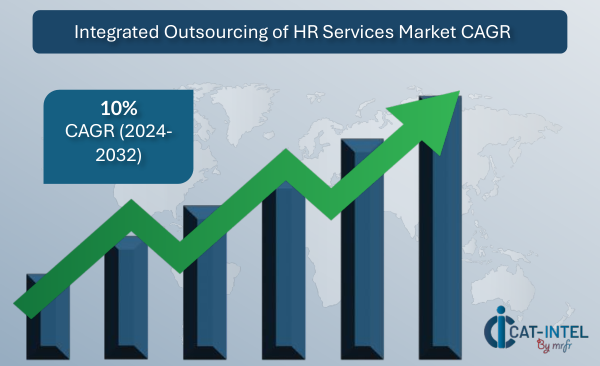
-
Sector Contributions: Growth is primarily driven by:-
Technology Adoption: Organizations are increasingly implementing advanced HR technologies, such as AI and automation, to streamline processes and enhance decision-making. -
Cost Efficiency: Businesses are outsourcing HR functions to reduce operational costs while maintaining service quality.
-
-
Technological Transformation and Innovations: Advances in human resources (HR) technology, including the development of cloud-based HR platforms, AI-driven recruitment tools, and automated performance management systems, are significantly improving the efficiency and effectiveness of HR services. These innovations enable companies to streamline HR processes, enhance employee engagement, and optimize talent management. In addition, the adoption of integrated outsourcing solutions in HR is becoming increasingly popular as organizations seek to reduce costs, gain access to specialized expertise, and focus on strategic initiatives. -
Funding Initiatives: Increased investments in HR technology and service providers are propelling market expansion and driving innovation in service offerings. -
Regional Insights: North America and Europe currently dominate the market, but the Asia-Pacific region is poised for rapid growth due to rising demand for HR outsourcing solutions and a growing focus on workforce management.
Key Trends Key Trends and Sustainability Outlook
-
Holistic HR Solutions: There is a growing preference for comprehensive outsourcing solutions that encompass multiple HR functions, enabling improved efficiency and collaboration. -
Data-Driven Decision-Making: Organizations are leveraging data analytics to optimize HR processes and enhance workforce management. -
Focus on Employee Engagement: Outsourcing partners are increasingly emphasizing employee engagement strategies to retain talent and improve workplace satisfaction.
Growth Drivers:
-
Regulatory Compliance: Organizations are seeking outsourced HR services to navigate complex labor laws and ensure compliance. -
Global Workforce Management: The need to manage diverse and remote workforces is driving demand for integrated HR solutions. -
Public Sector Investments: Increased funding in HR initiatives by public and private sectors is supporting the growth of the outsourcing market. -
Digital Transformation: The shift towards digital HR processes is enhancing efficiency and collaboration among service providers and clients.
Overview of Market Intelligence Services for Adoption of Integrated Outsourcing of HR Services Market
Recent analysis indicates that the adoption of integrated outsourcing of HR services is increasing, driven by rising operational costs and the need for organizations to enhance efficiency. As businesses face financial pressures, market reports provide essential insights into cost management strategies and potential savings.
Key findings highlight that many organizations are turning to integrated HR outsourcing to streamline operations and reduce costs associated with managing in-house HR functions. These reports offer detailed assessments of service pricing trends and the benefits of outsourcing, enabling stakeholders to make informed decisions regarding their HR strategies.
By leveraging insights from these reports, organizations can implement effective strategies to optimize their HR functions, manage labor costs, and improve service delivery. The focus on integrated solutions allows businesses to consolidate HR processes, leading to enhanced efficiency and better workforce management.
Procurement Intelligence for Adoption of Integrated Outsourcing of HR Services Market : Category Management and Strategic Sourcing

To stay ahead in the active components market, companies are optimizing procurement strategies, leveraging spend analysis solutions for vendor spend analysis, and enhancing supply chain efficiency through supply market intelligence. Procurement category management and strategic sourcing are becoming vital in achieving cost-effective procurement and ensuring the timely availability of high-quality materials to produce active components.
Pricing Outlook for Integrated Outsourcing of HR Services Market: Spend Analysis
The integrated outsourcing of HR services market is currently navigating a dynamic pricing landscape characterized by a gradual increase in service costs. This upward trend is driven by heightened demand for comprehensive HR solutions, advancements in technology, and the increasing complexity of compliance requirements.
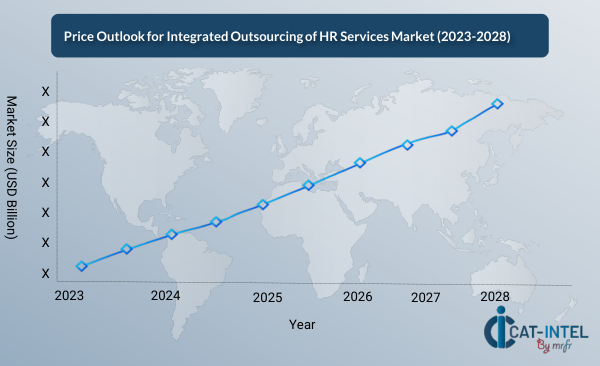
The graph shows a general upward trend in pricing for Integrated Outsourcing of HR Services Market , likely due to rising costs, increased complexity, and growing demand. However, there may be fluctuations influenced by economic conditions, technological advancements, and competitive dynamics.
Comprehensive Price Forecast:
Recent analyses indicate a sustained growth trajectory, fueled by several key factors, including:
-
Rising Demand for Integrated Solutions: Organizations are increasingly seeking holistic HR services that combine various functions, such as payroll, recruitment, and talent management, leading to higher pricing structures. -
Technological Advancements: Investments in HR technology, including automation and data analytics, are contributing to the overall cost of outsourcing services.
-
Market Competition: As more organizations adopt integrated HR outsourcing, competition among service providers is intensifying, affecting pricing models and service offerings.
Cost Breakdown for Adoption of Integrated Outsourcing of HR Services Market: Cost saving Opportunity
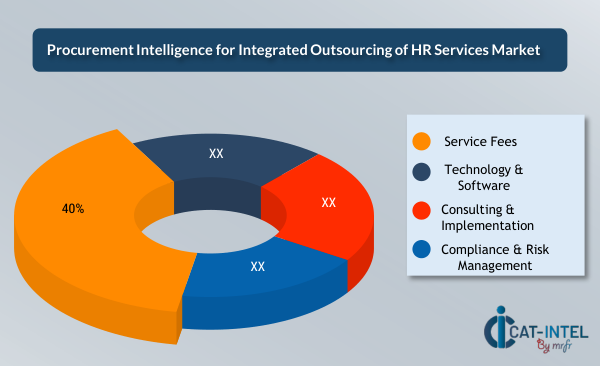
- Service Fees (40%)
-
Description: Covers provider fees for managing various HR functions, including payroll, recruitment, benefits administration, and compliance. -
Trends: Increasing demand for integrated HR services has led to a rise in service fees. Organizations are focusing on long-term agreements with providers to secure stable pricing and gain access to bundled services at competitive rates.
- Technology & Software (XX%)
-
Description: XX -
Trends: XX
- Consulting & Implementation (XX%)
-
Description: XX -
Trends: XX
- Compliance & Risk Management (XX%)
-
Description: XX -
Trends: XX
Cost saving opportunity: Negotiation Lever and Purchasing Negotiation Strategies
Cost-saving opportunities in the integrated outsourcing of HR services market are abundant, especially for organizations that leverage strategic procurement practices. By selecting vendors that offer bundled HR solutions—such as payroll, recruitment, and benefits administration—companies can capitalize on economies of scale and lower overall costs. Negotiating long-term contracts with outsourcing providers secures favorable pricing, protecting against market fluctuations. Implementing performance-based incentives further ensures high-quality service delivery aligned with cost-saving goals.
Additionally, integrating advanced HR technologies, like automation and data analytics, streamlines processes, reduces manual labor expenses, and minimizes costly errors. Some organizations achieve further savings by outsourcing to regions with lower labor costs, although quality and compliance must remain top priorities. Regular audits of outsourced HR processes help identify inefficiencies, fostering continuous improvement and maximizing savings potential. These strategies allow organizations to reduce expenses while enhancing the efficiency of their HR functions.
Supply and Demand Overview of the Adoption of Integrated Outsourcing of HR Services Market: Demand-Supply Dynamics
The adoption of integrated outsourcing of HR services market is experiencing significant growth, driven by increasing demand for cost-effective and streamlined HR solutions. Organizations are increasingly outsourcing HR functions such as payroll, recruitment, benefits administration, and talent management to specialized service providers. Demand is particularly high due to the growing need for companies to focus on core business functions while improving efficiency, compliance, and employee engagement.
Demand Factors:
-
Cost Efficiency Needs: Rising operational costs drive organizations to seek outsourcing for cost-effective HR management solutions. -
Focus on Core Competencies: Businesses are increasingly outsourcing HR to focus resources on primary operations, boosting demand for specialized providers. -
Compliance Complexity: Growing regulatory requirements make compliance challenging, pushing demand for expert outsourcing to mitigate risks. -
Technology Integration: The need for advanced HR technologies, like automation and AI, is increasing demand for providers equipped with digital solutions.
Supply Factors:
-
Diverse Service Models: Providers offer a range of services, from full-scale HR management to specific functions, catering to varied organizational needs. -
Global Provider Network: A broad network of providers across regions enables competitive pricing and tailored solutions. -
Innovation in HR Tech: Technological advancements allow providers to offer enhanced data analytics, automation, and customized platforms. -
Increased Provider Competition: Market competition among outsourcing firms encourages quality improvements and favorable pricing for clients.
Regional Demand-Supply Outlook: Adoption of Integrated Outsourcing in HR Services
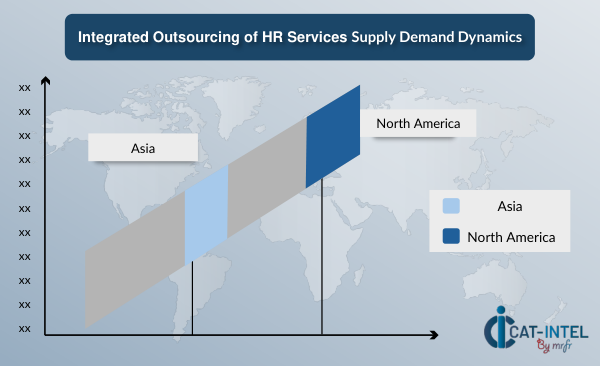
The image shows growing demand for HR Outsourcing Market in both North America and Asia, with potential price increases and increased competition
North America: Leading in North America, particularly the U.S. and Canada, continues to lead the HR outsourcing market, characterized by:
-
High Corporate Demand: With a strong emphasis on cost-efficiency, organizations seek integrated HR solutions to streamline payroll, recruitment, and compliance, driving substantial demand. -
Established Provider Network: Leading providers offer comprehensive, technology-enabled HR services, meeting high organizational standards and fostering market stability. -
Innovation in HR Tech: Continuous advancements in AI and automation within HR outsourcing are increasing operational efficiency, solidifying North America's market position. -
Regulatory Compliance Needs: A complex regulatory landscape fuels demand for expertise in compliance management, incentivizing companies to partner with specialized HR providers. -
Strategic Global Influence: Strong ties with global markets allow North American firms to set trends in HR outsourcing, influencing international standards and practices.
North America remains a key hub for HR Outsourcing Market innovation and growth

Supplier Landscape: Supplier Negotiations and Strategies for the Adoption of Integrated Outsourcing of HR Services Market
The supplier penetration in the adoption of integrated outsourcing of HR services market is growing rapidly, with a significant increase in the number of global and regional players contributing to the development and delivery of HR outsourcing solutions. These suppliers play a crucial role in the overall market dynamics, impacting pricing, service innovation, and accessibility. The market is highly competitive, with suppliers ranging from large, established outsourcing firms to specialized HR service providers offering niche services such as talent acquisition, employee benefits management, and payroll processing.
Currently, the supplier landscape is characterized by a mix of global players with a broad service offering, as well as regional firms with specialized solutions tailored to local markets. The market is seeing increased consolidation among large HR outsourcing firms, which dominate the market share. However, smaller, innovative companies and startups are also expanding their footprint by focusing on cutting-edge HR technologies such as artificial intelligence (AI) and data analytics, which help improve decision-making and workforce management.
Some of the key suppliers in the Adoption of Integrated Outsourcing of HR Services Market include:
- ADP (Automatic Data Processing)
- Randstad
- ManpowerGroup
- Alight Solutions
- Ceridian
- Workday
- Tata Consultancy Services (TCS)
- IBM
- Xerox
- Accenture
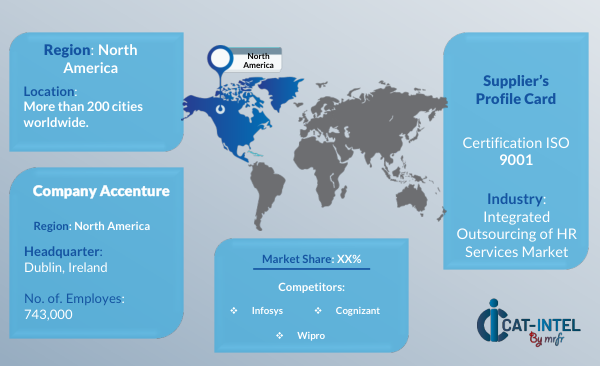
Key Development: procurement Category significant development
Significant Developments |
Description |
Increased Automation and AI Integration |
Leveraging AI and automation to streamline HR processes, enhancing efficiency and reducing costs in recruitment, engagement, and performance management. |
Rise of Hybrid Work Models |
Adapting HR offerings to support remote workforce management and performance tracking in hybrid work environments. |
Focus on Employee Experience |
Enhancing employee experience through personalized HR services, investing in tools for better communication, training, and career development. |
Data-Driven Decision Making |
Using data analytics to make informed decisions regarding talent acquisition, retention strategies, and overall workforce management. |
Expansion of Global Services |
Expanding HR outsourcing services across borders, offering local compliance expertise and multi-country payroll solutions. |
Procurement Attribute/Metric |
Details |
Market Sizing |
The integrated outsourcing of HR services market is projected to grow from USD 36.72 billion in 2024 to USD 50 billion by 2032, with a CAGR of 10% (2023-2032). |
HR Services Outsourcing Adoption Rate |
50% of organizations are increasing their adoption of integrated HR outsourcing models to improve workforce management and enhance operational efficiency. |
Top HR Outsourcing Strategies for 2024 |
Emphasis on digital HR technologies, employee experience optimization, cost reduction, and workforce flexibility through outsourcing partnerships. |
HR Services Outsourcing Automation |
40% of organizations have automated over 50% of their HR processes, including recruitment, payroll, and benefits management. |
HR Outsourcing Challenges |
Key challenges include managing data security, ensuring compliance with labor laws, and aligning outsourced services with company culture and objectives. |
Key Suppliers |
Leading suppliers include ADP, Accenture, Deloitte, IBM, and Randstad. These providers focus on comprehensive HR outsourcing solutions covering payroll, recruitment, and employee benefits management. |
Key Regions Covered |
North America, Europe, Asia-Pacific, and Rest of the World, with a specific focus on the U.S., U.K., India, and China due to high outsourcing demand and cost optimization. |
Market Drivers and Trends |
Market growth is driven by the need for cost reduction, better workforce management, and access to global talent pools. Trends include AI-driven recruitment, HR analytics, and flexible outsourcing models. |










